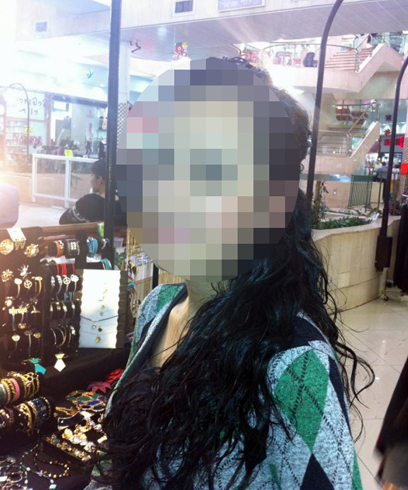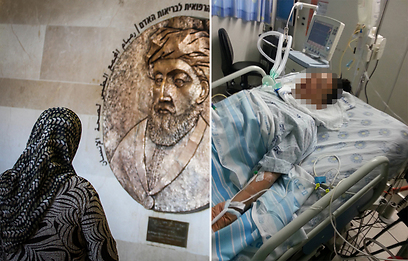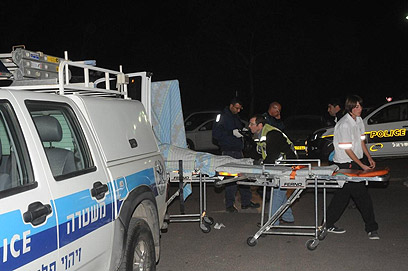
That was the beginning of a period S. calls "jail". According to her, her husband, then 24-years-old, "would restrict me in every part of my life. He would not even let me leave the house. After five-months I demanded a divorce."
Related stories
- Palestinian women rally against domestic violence
- Arab women highlight of grim year, columnist says
- Op-ed: Israeli society oppresses women
She then returned home and at 21 remarried. Today S. is a mother of six, the eldest of which, 17, is from her first brief marriage. "I will not allow my daughter to marry at the age I first did. She must study and work on her future. She should choose the suitor that suits her – otherwise I will loose her."
Her eldest daughter knows the story. "It breaks my heart to think about what my mother went through. I have learned so much from her and I know that people who force marriage at that age are not human."

S.' daughter: 'My heart breaks to hear what she went through'
The high-school student recalls how "not too long ago, two school-mates of mine, both 16, got married. I had a bad feeling about it when I was at the wedding. One told me that she is despaired; she said she feels very bad and has poor relations with her husband because it was not a marriage she willingly entered.
"Unfortunately, I am sure she will suffer more as time goes on, if she will not be strong the result will be a nasty divorce," if not worse.
This week, the story of a 16-year-old from Nazareth shocked the country. The teenage girl was attacked by a 51-year-old neighbor who poured acid on her face. The assailant, himself a married father of five, had allegedly demanded to take her as a second wife.
The girl is still hospitalized in serious condition and it remains unclear whether she will regain use of her vision.
However, Saturday saw her family preparing for her engagement party to another man. The story pushed back into the spotlight the issue of teen marriage and the plight of young girls forced to marry so young.

Injured girl (R) her mother (L) (Photo: Avishag Shaar-Yashuv and Elad Gershgoren)
According to the Central Bureau of Statistics, some 3000 Arab girls under the age of 18 get married every year. More than one third (37%) marry by the age of 19.
One thousand of those marry under the age of 17 and 82% of all under-17 marriages in Israel happen in the Arab sector. These numbers have fluctuated only slightly over the last couple of years.
'I stared death in the eye'
For H., a 27-year-old from Wadi Ara, her marriage at the age of 15 was just the beginning of what has been a never-ending nightmare.
"I stared death in the eyes after my family forced me to marry my cousin, whom I hated. I tried to push him away so as not live together but my father pressured me. Every time I told him I don’t want to get married he would tie me and beat me until I consented. All of these years I have kept quiet because of the fear."
After the forced marriage, "I asked my husband not to get close to me. Unfortunately, he wasn’t persuaded and wanted me even if it involved force. After a year our relations deteriorated and I could barley find it in me to look at him. I asked him for a divorce but he attacked me and made very serious threats."
H. is still trapped in the abusive marriage.
"Today we have two children, but I have a difficult and hard life, I feel degraded and humiliated. Even my family has abandoned me because of economic hardship; they just didn’t take me into consideration.
"As a woman I had aspirations, I wanted to continue with my academic studies and build a bright future for myself, but that was all destroyed, and there is no one who listens to me."
'No family or support, no education or money'
G., an 18-year-old from the Judean foothills, ran away from home a week ago.
After a joint search effort with the Na'am (Arab Women from the Center) organization she was found and taken into care by welfare authorities. According to her testimony, her family was forcing her to marry a man from the West Bank against her will.
"I saw my sister getting married at this age because of a family feud and poverty, she eventually divorced," she explains.
In tears she painfully shares her plight: "No family or support, no education or money – I am a complete virgin. But I do know one thing – I do not want to marry and live a miserable life with a man I did not choose."
Samah Salayma Agabaria, a social worker who runs the Lod branch of Na'am, says that child marriage has a bigger chance of leading to "domestic violence, premature birth or multiple births at a stage where the young mother is far from being prepared for motherhood."
According to her, "more times than not, these are miserable lives. Many times we meet women in their early twenties, single moms, without work or education that want to start anew."
The previous Knesset plenum saw the first-reading approval of a bil raising the minimum age of marriage from 17 to 18.
The bill – the fruit of a rare collaboration between MK Hanin Zoabi ( Balad) and Yariv Levin (Likud) – enjoyed the government's support and is expected to garner enough votes to be fully ratified.
However, the real problem, it seems, is not legislation but enforcement; as a large number of child marriages are performed under the auspices of sheihks who take their time in reporting the matrimonial arrangements.
The number of complaints filed with the police reporting violations of the Marriage Age Law between 2000 and 2011 was a meagre 62.
Out of numerous investigations launched as a result, only 36 resulted in criminal files being opened for the men, while only three were against those who married the girls off and none where against those who actually performed the ceremony or assisted in the process.
"If we were to worry about enforcing the Marriage Age Law and the Compulsory Education Law for those up to the age of 18, as well as sexual education and facilitating institutions for needy girls maybe G. wouldn't have run away from home," Agabaria says.
Bedouin council head: 'I have nothing to do'
For Bedouins in the Negev, the situation appears even worse.
An especially rough case forced the silenced issue to the surface: Last month, a 17-year-old from Tel Sheva stabbed her 41-year-husband to death. She was given to him as a second wife just a day before.

Negev crime scene (Herzel Yosef)
Moreover, this was her second marriage; her first resulted in a failed suicide attempt and a divorce.
Mussa Abu Asa, head of the Tel Sheva Regional Council explains that "There is tension between the law and the parents. The law outlaws it, and we, as a government authority do not condone it.
"But these things are up to the girl, her parents and the man who wants to marry her. They know it is a felony, but we cannot tell these people to marry or not."
The council head tries to pass the buck: "It is their responsibility; we cannot know how old every girl who gets married is. When we know, we try to take care of it. But when there is no problem we have no way of knowing. We lack the tools."
Mona Elhabnin, who heads the Amerat (Princess) of the Desert organization which assists Bedouin women in the Negev and informs them of their rights, notes some improvement in the situation.
"There are educated women who are socially active. However, there are obviously still practices which oppress women. The moment the family hits hard times and a wealthy older man comes along the father won't think twice about marrying his daughter off.
"I have met women, now in their fifties, who were married against their will when they were girls. Most are from the West Bank or Gaza and no one thinks twice about marrying them off as a second or third wife.
"Not long ago I heard of a woman who was married at the age of 13. She didn't even know that she was getting married; only that she was going on a trip with her soon-to-be husband.
"Today she has children and grandchildren, but at times she feels he was not the man she really wanted. She never found love."
Ilana Curiel contributed to this report
- Receive Ynetnews updates
directly to your desktop















